几种带有否定词的比较句型
英语中肯定形式表否定意义的几种表达

英语中肯定形式表否定意义的几种表达-英语论文英语中肯定形式表否定意义的几种表达浙江杭州外国语学校王丹英语中表否定的方式有很多,除了使用绝对否定词表达否定以外,还可以通过单词、词组、句型和特定的句子等形式来表示相对的含蓄否定,这样既可以避免否定词的重复使用,也能使否定语气缓和而富有感情。
笔者把一些常见的肯定形式表否定意义的表达法总结归纳如下。
一、表示含蓄否定的单词1. 名词, 如absence,failure,lack,refusal等。
His absence of mind during the driving nearly caused an accident. 他开车时心不在焉,差点酿成交通事故。
He was upset by his failure in the exam. 他因考试不及格而感到沮丧。
2. 动词,如avoid,escape,miss,stop等。
She braked suddenly and avoided an accident. 她紧急刹车,从而避免了一场车祸。
The pin escaped my eyes. 我没有看见那根针。
3. 形容词,如different,ill,poor,wrong等。
Lily and Lucy are quite different even though they are twins. 莉莉和露西尽管是双胞胎,但却很是不一样。
He is in ill health. 他身体不好。
4. 介词,如above,beyond,instead of,out of等。
The novel is above me. 这本小说我看不懂。
The progress of the reform and open in every respect in China is indeed beyond belief. 中国在改革开放方面取得的进展的确令人难以置信。
5. 连词,如before,or,unless等。
英语中否定形式表示肯定意义的句型总结

英语中否定形式表示肯定意义的句型总结英语中有些句子“貌相”(形式)否定,实则表示肯定的意义,甚至表示非常强烈的肯定意义。
此类句子尤其容易出现在阅读理解中给考生增加干扰因素。
就此语言现象归纳总结如下句型,希望大家能够复习之。
1.can / could not...toocan / could never ...too表示“无论怎样也不过分”。
例如:·You cannot be too careful when crossing the street. 穿越马路时,再怎么小心也不为过。
·You can never be too careful in performing an experiment. 做实验越仔细越好。
2.can / could not...enough意为“无论怎么都不够”,表示强烈的肯定。
例如:·I cannot thank you enough. 我对你感激不尽。
·You can't be careful enough. 你越小心越好。
3.nothing but表示“只有,只不过”,含肯定意义。
例如:·We could see nothing but water. 我们只看见一大片水。
·She does nothing but listen to records. 她除了听唱片什么也不做。
4.never too...to是对too...to的再否定,表示肯定。
例如:·It's never too old to learn. 活到老,学到老。
It is never too late to give up prejudices. 放弃偏见永远不晚。
5.not …without …没有……就没有;在这个句型中,使用两个否定,用来加强语气,表示肯定意义。
例如:·One cannot live even a few minutes without air. 没有空气,人们甚至连几分钟也不能生存。
高考英语形容词和副词在语法填空和改错题中的6个考点
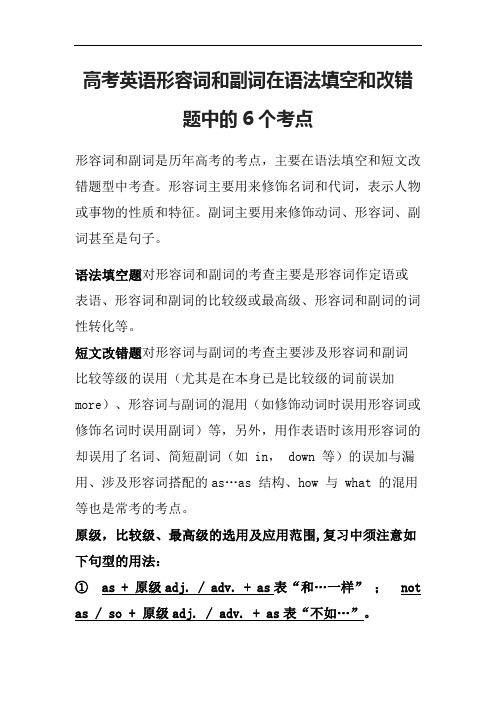
高考英语形容词和副词在语法填空和改错题中的6个考点形容词和副词是历年高考的考点,主要在语法填空和短文改错题型中考查。
形容词主要用来修饰名词和代词,表示人物或事物的性质和特征。
副词主要用来修饰动词、形容词、副词甚至是句子。
语法填空题对形容词和副词的考查主要是形容词作定语或表语、形容词和副词的比较级或最高级、形容词和副词的词性转化等。
短文改错题对形容词与副词的考查主要涉及形容词和副词比较等级的误用(尤其是在本身已是比较级的词前误加more)、形容词与副词的混用(如修饰动词时误用形容词或修饰名词时误用副词)等,另外,用作表语时该用形容词的却误用了名词、简短副词(如 in, down 等)的误加与漏用、涉及形容词搭配的as…as 结构、how 与 what 的混用等也是常考的考点。
原级,比较级、最高级的选用及应用范围,复习中须注意如下句型的用法:①as + 原级adj. / adv. + as表“和…一样” ;not as / so + 原级adj. / adv. + as表“不如…”。
例如:John plays football as well as David.Tom does not play the piano so/as well as Jack.The violin in the other shop will be cheaper, but not as good.②as + 原级adj. + a(n) + n. + as表“跟…一样”。
例如:It’s believed that teaching is as much an art as it is a science.Our neighbor has as big a house as ours.③比较级 + than表“比…更” ;less+原级+ than表“不如…”。
例如:This year they have produced less grain than they did last year.This road is wider than that one.④the + 比较级, the + 比较级,表示“越…,就会越…”。
否定词加比较级例句

否定词加比较级例句一级标题:否定词加比较级例句对句意的影响二级标题:否定词在比较级句型中的使用在英语中,否定词的使用可以对比较级句型的句意产生影响。
否定词包括”Not”、“Never”、“Nothing”等,在用于比较级句型时,会改变句子的含义。
三级标题:否定词在形容词比较级句中的使用1.He is not taller than his brother.2.This book is not more interesting than the previous one.3.The weather is not colder today than yesterday.三级标题:否定词在副词比较级句中的使用1.She can’t run faster than her friend.2.He didn’t speak more clearly than the other candidates.3.I can’t eat less slowly than my sister.二级标题:否定词加比较级例句的语法规则结构:否定词 + 比较级形容词/副词 + than三级标题:否定词与比较级形容词的使用1.“Not” + 比较级形容词 + than 例如:–This car is not faster than the previous model.–He is not taller than his father.2.“Never” + 比较级形容词 + than 例如:–I have never seen a bigger whale than this one.–We have never had a more difficult test than this.3.“Nothing” + 比较级形容词 + than 例如:–Nothing is more important than your health.–There is nothing more beautiful than a sunset.三级标题:否定词与比较级副词的使用1.“Not” + 比较级副词 + than 例如:–She does not run faster than her brother.–He did not speak more clearly than the others.2.“Never” + 比较级副词 + than 例如:–I have never slept later than 9 am.–They have never walked more slowly than this.3.“Nothing” + 比较级副词 + than 例如:–There is nothing I enjoy more than traveling.–There is nothing she dislikes more than spiders.二级标题:否定词加比较级例句的用途和表达方式在英语中,否定词加比较级例句常用于强调否定的含义,表达某种事物与其他事物相比的缺点或不足。
高考英语最后冲刺 知识点精讲 形容词比较级和最高级表示否定意义
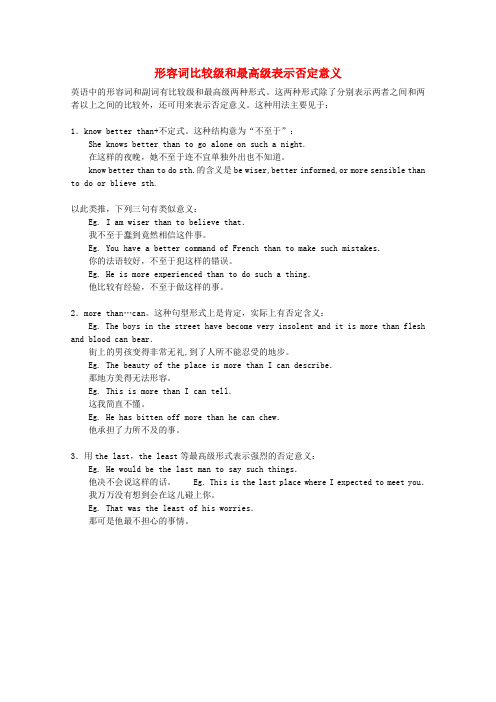
形容词比较级和最高级表示否定意义英语中的形容词和副词有比较级和最高级两种形式。
这两种形式除了分别表示两者之间和两者以上之间的比较外,还可用来表示否定意义。
这种用法主要见于:1.know better than+不定式。
这种结构意为“不至于”:She knows better than to go alone on such a night.在这样的夜晚,她不至于连不宜单独外出也不知道。
know better than to do sth.的含义是be wiser,better informed,or more sensible than to do or blieve sth.以此类推,下列三句有类似意义:Eg. I am wiser than to believe that.我不至于蠢到竟然相信这件事。
Eg. You have a better command of French than to make such mistakes.你的法语较好,不至于犯这样的错误。
Eg. He is more experienced than to do such a thing.他比较有经验,不至于做这样的事。
2.more than…can。
这种句型形式上是肯定,实际上有否定含义:Eg. The boys in the street have become very insolent and it is more than flesh and blood can bear.街上的男孩变得非常无礼,到了人所不能忍受的地步。
Eg. The beauty of the place is more than I can describe.那地方美得无法形容。
Eg. This is more than I can tell.这我简直不懂。
Eg. He has bitten off more than he can chew.他承担了力所不及的事。
英语中肯定形式表否定意义的几种表达

英语中肯定形式表否定意义的几种表达英语中表否定的方式有很多,除了使用绝对否定词表达否定以外,还可以通过单词、词组、句型和特定的句子等形式来表示相对的含蓄否定,这样既可以避免否定词的重复使用,也能使否定语气缓和而富有感情。
笔者把一些常见的肯定形式表否定意义的表达法总结归纳如下。
一、表示含蓄否定的单词1. 名词, 如absence,failure,lack,refusal等。
His absence of mind during the driving nearly caused an accident. 他开车时心不在焉,差点酿成交通事故。
He was upset by his failure in the exam. 他因考试不及格而感到沮丧。
2. 动词,如avoid,escape,miss,stop等。
She braked suddenly and avoided an accident. 她紧急刹车,从而避免了一场车祸。
The pin escaped my eyes. 我没有看见那根针。
3. 形容词,如different,ill,poor,wrong等。
Lily and Lucy are quite different even though they are twins. 莉莉和露西尽管是双胞胎,但却很是不一样。
He is in ill health. 他身体不好。
4. 介词,如above,beyond,instead of,out of等。
The novel is above me. 这本小说我看不懂。
The progress of the reform and open in every respect in China is indeed beyond belief. 中国在改革开放方面取得的进展的确令人难以置信。
5. 连词,如before,or,unless等。
He was hit on the head and fainted before he could figure out what had happened. 他还不知道发生了什么,就被人打在头上,昏了。
高中英语双重否定句的几种常见句型

英语双重否定句的几种常见句型英语句子中常可见到两个表示否定意义的词连用的情况,这一现象常称为双重否定。
这种句子形式上虽为否定,实则表示强烈的肯定语气。
英语双重否定句常见的有如下三种句型:1、否定词no/not等+表示否定意义的形容词。
例如:He has no small reputation as a scientist.他是名气很大的科学家。
No way is impossible to courage.勇士面前无险路。
It is not uncommon for students to have friendly relationship with their teachers.学生与老师建立友好关系并不罕见。
It is conflict and not unquestioning agreement that keeps freedom alive.使自由保持活力的是冲突而不是绝对的一致。
Nothing is unnecessary.没有什么是不必要的。
2、否定词no/not/never等+without…No smoke without fire·[proverb][谚]无火不起烟;无风不起浪。
We cannot succeed without your help.没有你们的帮助,我们就不能成功。
They never meet without quarreling.他们每次见面必吵架。
Nothing to be got without pains but poverty.[proverb][谚]只有贫穷是可以不劳而获的。
3、否定词no/not/never/nobody/few等+具有否定意义的动词或短语。
There is no denying the truth.真理是不能否认的。
The tart reply did not discomfort him.那尖刻的回答并没有使他难过。
否定句的否定词和句型结构
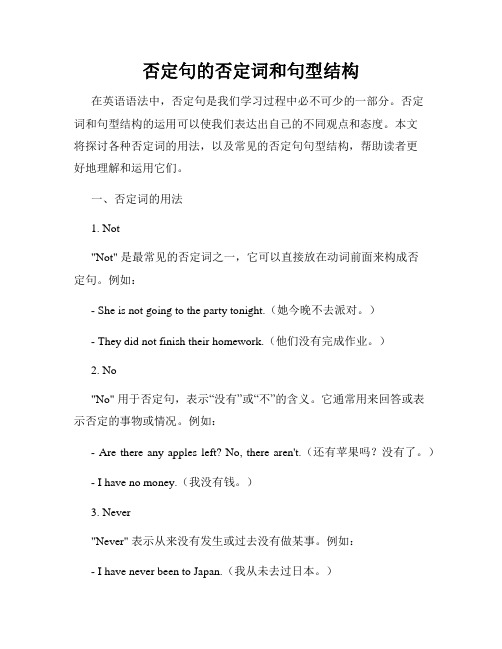
否定句的否定词和句型结构在英语语法中,否定句是我们学习过程中必不可少的一部分。
否定词和句型结构的运用可以使我们表达出自己的不同观点和态度。
本文将探讨各种否定词的用法,以及常见的否定句句型结构,帮助读者更好地理解和运用它们。
一、否定词的用法1. Not"Not" 是最常见的否定词之一,它可以直接放在动词前面来构成否定句。
例如:- She is not going to the party tonight.(她今晚不去派对。
)- They did not finish their homework.(他们没有完成作业。
)2. No"No" 用于否定句,表示“没有”或“不”的含义。
它通常用来回答或表示否定的事物或情况。
例如:- Are there any apples left? No, there aren't.(还有苹果吗?没有了。
)- I have no money.(我没有钱。
)3. Never"Never" 表示从来没有发生或过去没有做某事。
例如:- I have never been to Japan.(我从未去过日本。
)- He never eats meat.(他从不吃肉。
)4. Neither/nor"Neither" 和 "nor" 通常用在两个否定选择之间,表示两者都不。
例如:- Neither the cat nor the dog is allowed on the couch.(既不允许猫上沙发,也不允许狗上沙发。
)- I neither agree nor disagree with your opinion.(我对你的观点既不同意也不反对。
)二、常见的否定句句型结构1. 否定词+动词在肯定句中,我们在动词前使用否定词"not" 来构成否定句。
例如:- He is reading a book.(他正在看书。
英语双重否定句的几种常见句型资料

英语双重否定句的几种常见句型英语双重否定句的几种常见句型英语句子中常可见到两个表示否定意义的词连用的情况,这一现象常称为双重否定。
这种句子形式上虽为否定,实则表示强烈的肯定语气。
英语双重否定句常见的有如下三种句型:1、否定词 no/not等+表示否定意义的形容词。
例如:He has no small reputation as a scientist.他是名气很大的科学家。
No way is impossible to courage.勇士面前无险路。
It is not uncommon for students to have friendly relationship with their teachers.学生与老师建立友好关系并不罕见。
It is conflict and not unquestioning agreement that keeps freedom alive.使自由保持活力的是冲突而不是绝对的一致。
Nothing is unnecessary.没有什么是不必要的。
2、否定词 no/not/never等+without…No smoke without fire·[proverb][谚]无火不起烟;无风不起浪。
We cannot succeed without your help.没有你们的帮助,我们就不能成功。
They never meet without quarreling.他们每次见面必吵架。
Nothing to be got without pains but poverty.[proverb][谚]只有贫穷是可以不劳而获的。
3、否定词 no/not/never/nobody/few等+具有否定意义的动词或短语。
There is no denying the truth.真理是不能否认的。
The tart reply did not discomfort him.那尖刻的回答并没有使他难过。
否定句的句型

否定句的句型否定句可以通过在句子中使用否定词或词组来表达否定的意思。
以下是几种常见的否定句句型:1. 主语+ 动词+ not + 其他成分例如:- I do not like chocolate.(我不喜欢巧克力。
)- They are not coming to the party.(他们不来参加派对。
)2. 主语+ 助动词+ not + 动词+ 其他成分例如:- She cannot swim.(她不会游泳。
)- We did not finish the project.(我们没有完成这个项目。
)3. 主语+ be动词+ not + 其他成分例如:- He is not happy.(他不开心。
)- The book is not on the shelf.(书不在书架上。
)4. 主语+ do/does/did + not + 动词原形+ 其他成分例如:- We do not eat meat.(我们不吃肉。
)- Did you not see the movie?(你没有看到那部电影吗?)5. 主语+ have/has/had + not + 过去分词/动词原形+ 其他成分例如:- She has not visited Paris.(她没有去过巴黎。
)- They had not finished their homework.(他们没有完成他们的作业。
)6. 主语+ cannot/may not/must not/should not + 动词原形+ 其他成分例如:- You cannot enter without a ticket.(没有票你不能进入。
)- We must not forget to lock the door.(我们不能忘记锁门。
)7. 主语+ 动词+ never/rarely/hardly/scarcely + 动词的副词形式+ 其他成分例如:- She never goes to bed early.(她从不早睡。
几种带有否定词的比较句型浅析

话
没有 比散步来保持健康更好的了。 T e snt n i a e f h e 做鞋用皮革再好不过 了。 hr i o igl el t r o sos e h k eh r 5n tig l e 或 n a )a ( S ) s 表 示“ 远 不像 … …那样 ” : .ohn i ( e r s 或 O …a : k 远 。如
。
H sn ee h nabga.他实 际上等 于一 个 乞丐 ei obt rta egr t T eivl sn et hn h a etra. 人 的情 况 和 昨天一 样 h nadi obtrta ew sys dv 病 i e e H a ob trasy i temat hn Ihv.他 和我一 样在 这件 事 上 没有发 言权 ehsn ee a n h trta ae t e 2n t a ymoeta .o… n r h n或 n r… ta 表 示 “ …… 一样不 ” o moe h n: 同 。如 :
与其说海洋分隔了世界 , 不如说海洋联结 了世界。 I d n t S c il e hm a ht h o ’ O mu h d si i s a i k e m.我与 其说 不喜 欢他 , 如说 我恨 他 。 不 4n t ig l e 表 示“ 有 什 么 能 比得 上 ……” .ohn i : k 没 。如 : T eei ntigl e hme 窝银 窝 , 如 自己的草 窝 。 hr s o n i o .金 h k 不
Hi a l ss f t e o m i n t i g lke s e e r t a o r . s nay i o h p e s o h n i a p n ta i ng s y u s
难句句型

英语难句句型(一)双重否定结构[1] There is no rule that has no exception. [译文]任何规则都有例外。
[2] There is not any advantage without disadvantage. [译文]有利必有弊。
[3] I’m not reluctant to accept your proposal. [译文]你的建议我愿意接受。
[4] It is impossible but that a man will make some mistakes. [译文]人不会不犯错误。
[5]Its significance and importance can never be overemphasized.[译文]它的意义和重要性,不管怎样强调,也不算过分。
[6]Hardly a month goes by without word of another survey revealing new depths of scientific illiteracy among U.S. citizens.[译文]美国公民科学知识匮乏的现象日益严重,这种调查报告几乎月月都有。
(二)间接的肯定结构[1] He didn’t half like the girl. [译文]他非常喜欢那姑娘。
[2] I couldn’t feel better. [译文]我觉得好极了![3] I couldn’t agree with you more. [译文]我太赞成你的看法了。
[4] If that isn’t what I want! [译文]我所要的就是这个呀![5] He can’t see you quick enough. [译文]他很想尽快和你见面。
(三)否定的陷阱1.not…because 不是因为……而……[1]The engine didn’t stop because the fuel was finished.[译文]引擎并不是因为燃料耗尽而停止运转。
2023年英语否定的几种表示方法整理
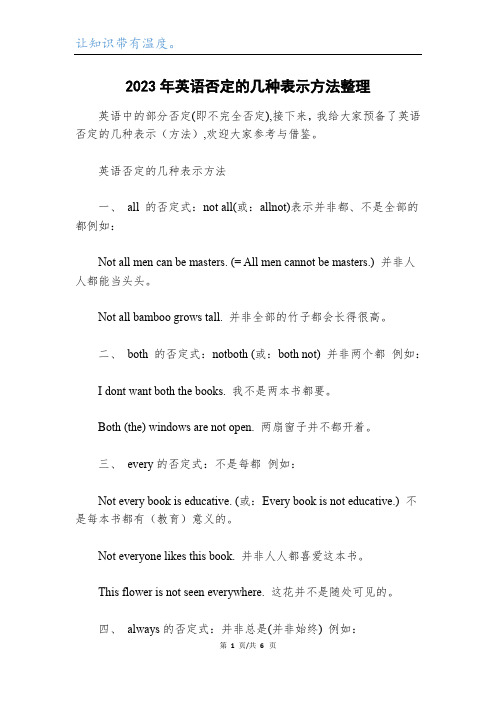
2023年英语否定的几种表示方法整理英语中的部分否定(即不完全否定),接下来,我给大家预备了英语否定的几种表示(方法),欢迎大家参考与借鉴。
英语否定的几种表示方法一、all 的否定式:not all(或:allnot)表示并非都、不是全部的都例如:Not all men can be masters. (= All men cannot be masters.) 并非人人都能当头头。
Not all bamboo grows tall. 并非全部的竹子都会长得很高。
二、both 的否定式:notboth (或:both not) 并非两个都例如:I dont want both the books. 我不是两本书都要。
Both (the) windows are not open. 两扇窗子并不都开着。
三、every的否定式:不是每都例如:Not every book is educative. (或:Every book is not educative.) 不是每本书都有(教育)意义的。
Not everyone likes this book. 并非人人都喜爱这本书。
This flower is not seen everywhere. 这花并不是随处可见的。
四、always的否定式:并非总是(并非始终) 例如:He is not always so sad. 他并不是始终都这样哀痛。
五、entirely1, altogether, completely2 和quite 的否定式:不完全,并非完全例如:The businessman is never to be entirely trusted. 不行以完全信任商人。
He felt not altogether satisfied3. 他并不完全满足。
I dont agree completely. 我并不完全同意。
What he did was not quite proper. 他做的不非常妥当。
几种主要的句式(一)

几种主要的句式(一)一、陈述句:指叙述一件事情或表达一种看法的句子1、肯定形式:1)主语+谓语+其它,例句:Susan likes skating in winter.You must look after your things.2)主语+系动词+表语,例句:Milk and eggs are good for your health.3)there be句型,例句:There is a table in the room.2、否定形式:1)谓语为be动词时,用be+not构成否定,例句:I’m not busy now.They were not at home last night. 2)谓语只有实义动词时,用do/doe+not构成否定例句:I do not like music.The farmer doesn’t want to shoot the rabbit.3)谓语为助动词+实义动词时,用助动词+not构成否定例句:I am going to play the computer games.Mike has not been to the Great Wall.4)谓语为情态动词+实义动词时,用情态动词+not构成否定例句:You shouldn’t stay up too late.We cannot go swimming with you this weekend.注意:一些否定词的缩写形式,如won’t, can’t等二、疑问句:指用来提出问题的句子,末尾用问号1、一般疑问句:通常用be, 助动词或情态动词开头,回答用yes或no, 朗读时用升调例句:Are you from Germany?Yes, I am./No, I am not.May I borrow your ruler?Yes, you can./No, you can’t.Does he often swim in summer?Yes, he does./No, he doesn’t.2、特殊疑问句:指对句子中某一部分提问的疑问句,以疑问词开头,一般用降调1)what引导的,用来询问“什么”,例句:What’s the time now, Jack?What colour is the car?Wh at’s the weather like today?What did you do last night?2)who引导的,用来询问“谁”,例句:who’s on duty today?Who told you the news?3)whose引导的,用来询问“谁的”,例句:Whose coats are these?4)which引导的,用来询问“哪一个”,例句:Which grade are you in?Which bag will they buy?5)when引导的,用来询问“什么时候”,例句:When did you go out?When does the school begin?6)why引导的,用来询问“为什么”,例句:Why is she crying?Why don’t we go together?7)where引导的,用来询问“在哪里”,例句:where does Mr. White live?Where did they have a picnic?8)how引导的,用来询问“怎么样”,例句:How are you today?How do you go to school every day?how many一般问数量,例句:how many carrots does the rabbit eat?how much一般问价格,例句:how much is the fish?How long一般问时间长短,例句:how long will you stay there?How often一般问频率,表示“多久一次”,例句:how often do they go to the cinema? 9)特殊疑问句的回答:不用yes或no, 根据实际情况,问什么就直接答什么3、选择疑问句:1)一般疑问句+or+可选择部分:例句:Do you like tea or coffee?Did they go to the gym by bike or by bus?2)选择疑问句+可选择部分+or+可选择部分例句:Who is Uncle Li, the old one or the young one?How do you come here, by car or on foot?注意:一般疑问句后面+or not, 也可以构成选择疑问句例句:Do you like the new dress or not?Have you had breakfast or not?3)选择疑问句的回答:不用yes或no, 根据实际情况直接回答4、反意疑问句:在陈述句后面,对陈述句所说的事实或看法提出疑问的句子1)肯定陈述句+否定结构的附加疑问句例句:Anny and Tom are classmate, are n’t they?He visited the Science Museum with Ben, didn’t he?2)否定陈述句+肯定结构的附加疑问句例句:Andy can’t speak English, can he?Susan isn’t very busy, is she?3)反意疑问句的回答:用yes或no来回答,如果陈述句部分内容是事实,就用yes来回答,后面用肯定结构,反之用no来回答,后面用否定结构例句:You can speak Russian, can’t you?Yes, I can./No, I can’t.It isn’t hot, is it?Yes, it is./No, it isn’t.三、综合练习:1、把下面句子分类:1)Would you like some potatoes?2)Are you coming or not?3)Sally didn’t go to the party, did she?4)May I use your computer?5)The cheese has gone bad, hasn’t it?6)Who’ll be there tomorrow?7)Can you buy me some salt?8)Where should I put these boxes?9)Is the answer right or wrong?10)what do you think of the film?一般疑问句_____________________________________________特殊疑问句_____________________________________________选择疑问句_____________________________________________反意疑问句_____________________________________________2、对下列问题,作简单的回答:1)Can you ride a bike? Yes, _____________________2)Is there anyone at home? No, ______________________3)Are you enjoying your English lesson? Yes, ___________________4)did they have a good time last night? Yes, __________________5)Has Mr Lee come back from his holiday? No, __________________3、根据回答,给疑问句补上恰当的疑问词:1)________ is your name? Smith.2)________ do you go to market? By bus.3)________ are the Greens coming? On Sunday.4)________ dictionary is this? It’s Lily’s.5)________ is the chair? It’s behind the door.6)________ is the man with a beard? He is Mr. Black.7)________ do you like better, baseball or tennis? Basket ball, I think.8)________ are you always late? Because of the traffic jam.4、将下面的反意疑问句补充完整:1)i am a good singer, ________ I?2)You are feeling much better now, ________ you?3)Fred doesn’t work in a factory, ________ he?4)The children clean their room themselves, ________ they?5)You haven’t heard from him, ________ you?5、阅读理解:(一)It is Sunday today.The weather is fine. Bob and Jane are in the park. It is a big park. They can see many people there. They come here to ha ve a rest after a week’s hard work and study. Some boys are playing chess on the grass. Some girls are singing and dancing. An old woman is reading a newspaper under a tall tree. A young man and his little son are playing with a toy car. How happy they are!判断正误,正确的在括号内写“T”,错误的写“F”()1. The weather is very good on Sunday.()2. Bob and Jane go to the park to work and study..()3. A young woman and her little son are playing with a toy car.()4. A lot of people are playing football on the grass.()5. All the people in the park look very happy.(二)A: Hello,Nancy, Welcome to my home!B: Thank you, Mike. What’s that over there?A: It’s my family photo.B: Who’s the man in dark green.A: He’s my grandfather.B: Are the man and woman your parents?A:Yes. The one with a big nose is my father. The one next to him is my mother.B: Is the girl in a red skirt your sister?A: No, she’s my uncle’s daughter. She is my cousin, Lily.B: She looks young and pretty. Is the woman in a white blouse your gran dmother?A: Yes, she is. She’s about sixty years old.B: Who’s the little baby in a blue hat? Is he your brother?A: No , it’s me!阅读对话,回答问题。
大学英语四级比较句式 (2)

几个值得注意的比较级句式一、the+比较级, the+比较级此句型表示后者随着前者的变化而变化,意为“越……就越……”,前者相当于一个条件句,因此,要用一般现在时代替一般将来时。
如:The better I knew him, the more I liked him. 我越了解他就越喜欢他。
The more difficult the questions are, the less likely I’ll be able to answer them. 题目越难我越答不出。
二、the+比较级+of the two表示“两者中较…的那个人或物”时,在比较级前加定冠词the。
如:He is the taller of the two. 他是两人中较高的那个。
She was the more promising worker of the two. 她是两人之中更有培养前途的工人。
三、比较级+and+比较级此句型表示“越来越…”,单音节形容词或副词用“-er+and +-er”,如:Things are getting better and better every day. 情况一天天好起来。
It’s becoming more and more difficult to find a job. 找工作越来越困难了。
Holiday nights are getting less and less expensive. 假日机票越来越便宜了。
四、not +比较级+ than / no +比较级+ than比较级前加not,表示前者不如后者,与not as…as相当;比较级前加no是对两者的否定,意为“和……一样不……”,与neither…nor…或“as+相反意义的形容词或副词+as”相当。
如:He is not taller than me. 他不如我高。
He is no taller than me. 他同我一样不高。
英语语法:带有否定词的比较句型
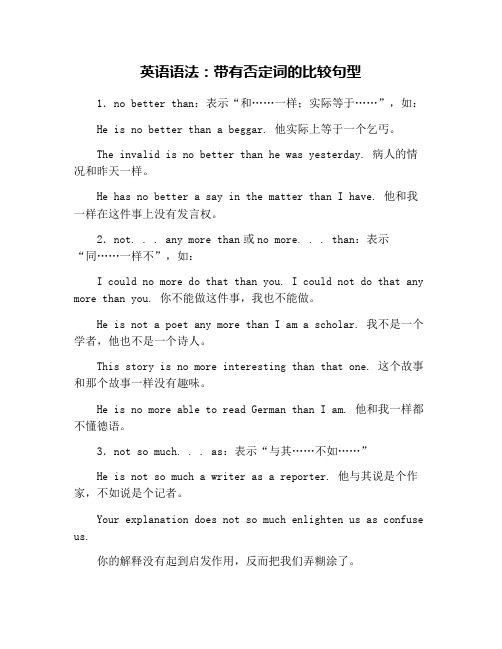
英语语法:带有否定词的比较句型1.no better than:表示“和……一样;实际等于……”,如:He is no better than a beggar. 他实际上等于一个乞丐。
The invalid is no better than he was yesterday. 病人的情况和昨天一样。
He has no better a say in the matter than I have. 他和我一样在这件事上没有发言权。
2.not. . . any more than或no more. . . than:表示“同……一样不”,如:I could no more do that than you. I could not do that any more than you. 你不能做这件事,我也不能做。
He is not a poet any more than I am a scholar. 我不是一个学者,他也不是一个诗人。
This story is no more interesting than that one. 这个故事和那个故事一样没有趣味。
He is no more able to read German than I am. 他和我一样都不懂德语。
3.not so much. . . as:表示“与其……不如……”He is not so much a writer as a reporter. 他与其说是个作家,不如说是个记者。
Your explanation does not so much enlighten us as confuse us.你的解释没有起到启发作用,反而把我们弄糊涂了。
Oceans don't so much divide the world as unite it. 与其说海洋分隔了世界,不如说海洋联结了世界。
I don't so much dislike him as hate him. 我与其说不喜欢他,不如说我恨他。
英语中否定形式表示肯定意义的句型总结

英语中否定形式表示肯定意义的句型总结英语中有些句子“貌相”(形式)否定,实则表示肯定的意义,甚至表示非常强烈的肯定意义。
此类句子尤其容易出现在阅读理解中给考生增加干扰因素。
就此语言现象归纳总结如下句型,希望大家能够重视。
1.can / could not...toocan / could never ...too表示“无论怎样也不过分”。
例如:·You cannot be too careful when crossing the street. 穿越马路时,再怎么小心也不为过。
·You can never be too careful in performing an experiment. 做实验越仔细越好。
2.can / could not...enough意为“无论怎么都不够”,表示强烈的肯定。
例如:·I cannot thank you enough. 我对你感激不尽。
·You can't be careful enough. 你越小心越好。
3.nothing but表示“只有,只不过”,含肯定意义。
例如:·We could see nothing but water. 我们只看见一大片水。
·She does nothing but listen to records. 她除了听唱片什么也不做。
4.never too...to是对too...to的再否定,即双重否定表示肯定。
例如:·It's never too old to learn. 活到老,学到老。
·It is never too late to give up prejudices. 放弃偏见永远不晚。
5.not …without …没有……就没有;在这个句型中,使用两个否定,用来加强语气,表示肯定意义。
例如:·One cannot live even a few minutes without air. 没有空气,人们甚至连几分钟也不能生存。
- 1、下载文档前请自行甄别文档内容的完整性,平台不提供额外的编辑、内容补充、找答案等附加服务。
- 2、"仅部分预览"的文档,不可在线预览部分如存在完整性等问题,可反馈申请退款(可完整预览的文档不适用该条件!)。
- 3、如文档侵犯您的权益,请联系客服反馈,我们会尽快为您处理(人工客服工作时间:9:00-18:30)。
His mind is no less alert than yours. 他的思路和你的一样敏捷。
Our soldiers fought with no less daring than skill. 我们的士兵作战的英勇不亚于他们的战斗技能。
5.nothing like(或near)as(或so)... as:表示“远远不像……那样”
This novel is nothing near so interesting as that one. 这篇小说远远不及那篇小说有趣。
The book is nothing like as difficult as I expected. 这本书远没有我想像的那么难懂。
His analysis of the poem is nothing like as penetrating as yours. 他对这首诗的分析远没有你的分析那样透彻。
6.no less … than:表示“和……一样”
He is no less act一样活跃。
This story is no more interesting than that one. 这个故事和那个故事一样没有趣味。
He is no more able to read German than I am. 他和我一样都不懂德语。
3.not so much. . . as:表示“与其……不如……”
There is nothing like home. 金窝银窝,不如自己的草窝。
There is nothing like walking as a means of keeping fit. 没有比散步来保持健康更好的了。
There is nothing like leather for shoes. 做鞋用皮革再好没有了。
几种带有否定词的比较句型
英语中表示比较的句型相当多,如果句型中插进了一个否定词,其意义和用法就很难掌握,下面介绍几种常见的表达方式:
1.no better than:表示“和……一样;实际等于……”,如:
He is no better than a beggar. 他实际上等于一个乞丐。
Oceans don't so much divide the world as unite it. 与其说海洋分隔了世界,不如说海洋联结了世界。
I don't so much dislike him as hate him. 我与其说不喜欢他,不如说我恨他。
4.nothing like:表示“没有什么能比得上……”
He is not so much a writer as a reporter. 他与其说是个作家,不如说是个记者。
Your explanation does not so much enlighten us as confuse us.
你的解释没有起到启发作用,反而把我们弄糊涂了。
The invalid is no better than he was yesterday. 病人的情况和昨天一样。
He has no better a say in the matter than I have. 他和我一样在这件事上没有发言权。
2.not. . . any more than或no more. . . than:表示“同……一样不”,如:
I could no more do that than you. I could not do that any more than you. 你不能做这件事,我也不能做。
He is not a poet any more than I am a scholar. 我不是一个学者,他也不是一个诗人。
